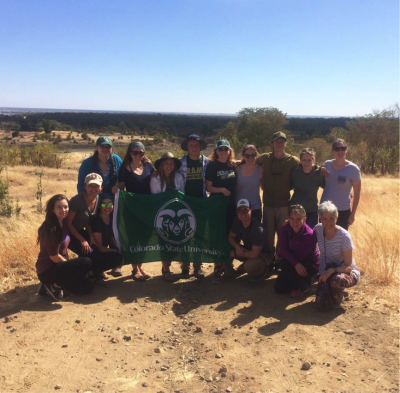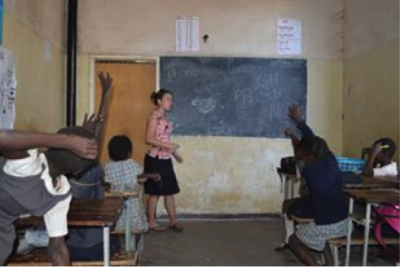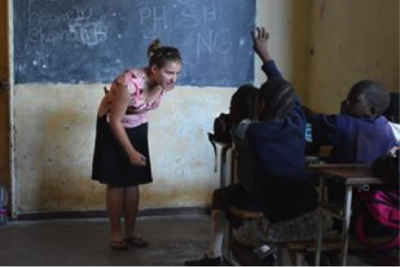
Dr. Ellen Brinks recently returned from Livingstone, Zambia where she led a group of CSU students on a study abroad program that focused on contributing to community education and health initiatives for the local people. For three weeks, they took part in experiential learning and internships through our Colorado State University Study Abroad program (and African Impact). The following field report is written by Madeline Kasic, who will be remaining in Zambia to continue working with African Impact for the next 9 weeks. Make sure to check out Madeline’s pre-departure post too!
William Carlos Williams states in his poem Paterson, “No ideas but in things” in regards to descriptive writing meaning that a writer should focus on physical objects instead of abstract concepts. This wisdom has been passed on to me many times in creative and academic writing classes during my time at Colorado State University. However, I have never understood how important the understanding things was until I began interacting with the people of Zambia.
Things are different here than in the United States; here everyday items that Americans have in abundance or consider to be disposable carry value. For example, most of my friends can go weeks without repeating an outfit and have no qualms about recycling water bottles or throwing away unwanted personal items. Zambians on the other hand may only have a few sets of clothes and it is not uncommon for them to wear the same clothes day after day. Furthermore, if a Zambian were to lose something that we might consider to be of little value, like a Nalgene water bottle, they would feel more of a sentimental loss because it was something that travelled with them daily for a significant amount of time. So when I say that things are different here in Zambia I mean that the people here interact with their personal items in a completely different way than we do in the U.S.
It may seem natural for a more impoverished group of people to have a different approach to personal items in terms of use and maintenance than an affluent group that can replace items at will, but the differences between how the Zambians see personal items goes farther than simply having less.

Every morning after I walk into my fifth grade classroom at Zambezi Sawmill Community School at least four students ask me if they can borrow a pen. They ask for many different reasons. Some do not have a pen to begin with because their family can hardly afford school supplies and others ask because the pen they brought has stopped working. I carry extra pens with me just for this reason. The first day I gave one of my students a pen I thought they would keep it, which was fine with me because I figured they needed it. However, when I was packing up after class the student came up to me and returned the pen with a practiced diligence that is rare in American fifth graders.
Over the next few weeks I lent pens to many different students, carrying six or seven with me at all times just to be prepared. Each time I have lent a pen to a student they have returned it to me without fail at the end of class. And although I now expect for them to be returned to me, I still marvel at the respect my students have for such a simple item.
In the US, a pen is a disposable item. I lend pens to my classmates and usually don’t expect to get them back. I figure that any pen I lose in this exchange replaces a pen I have “borrowed” and accidently taken with me when the class ends. But here in Zambia pens are valuable.
 I have spent a lot of time thinking about why the Zambian children I teach are so much more respectful of my property than I expected them to be. I have come up with two reasons. The first is that as stated earlier, here, even the smallest item is valuable. The other reason is a result of the first. Because of the level of poverty and the value of simple items, there is a lot of theft in poor communities like the one my school is located in. My students, therefore go to great lengths to protect their reputation as someone who does not steal. There is no such thing as forgetting to return something at Zambezi Sawmill Community School, and the students are very aware of this fact.
I have spent a lot of time thinking about why the Zambian children I teach are so much more respectful of my property than I expected them to be. I have come up with two reasons. The first is that as stated earlier, here, even the smallest item is valuable. The other reason is a result of the first. Because of the level of poverty and the value of simple items, there is a lot of theft in poor communities like the one my school is located in. My students, therefore go to great lengths to protect their reputation as someone who does not steal. There is no such thing as forgetting to return something at Zambezi Sawmill Community School, and the students are very aware of this fact.